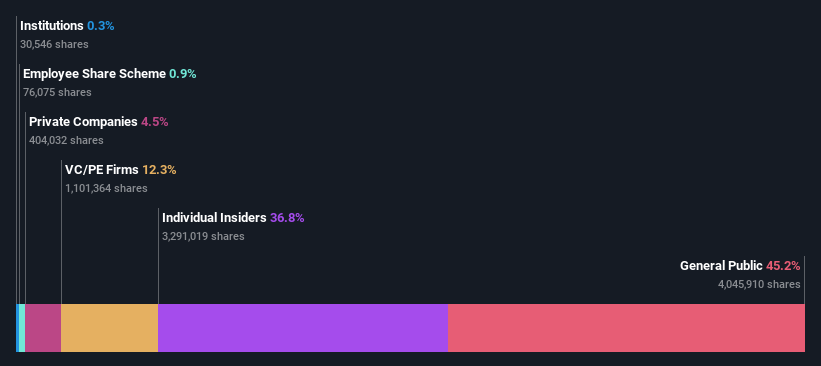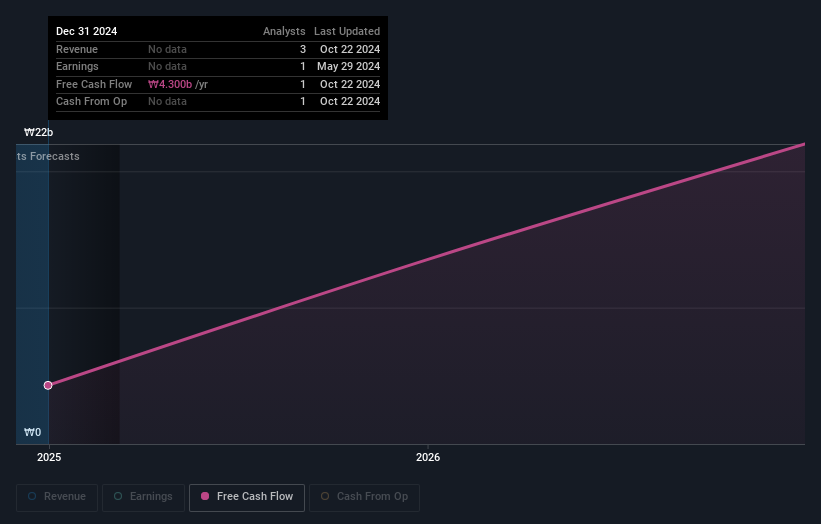- South Korea
- /
- Auto Components
- /
- KOSDAQ:A107640
Retail investors invested in HanJung Natural Connectivity System.co.,Ltd (KOSDAQ:107640) copped the brunt of last week's ₩64b market cap decline

Key Insights
- HanJung Natural Connectivity System.co.Ltd's significant retail investors ownership suggests that the key decisions are influenced by shareholders from the larger public
- A total of 4 investors have a majority stake in the company with 53% ownership
- Insider ownership in HanJung Natural Connectivity System.co.Ltd is 37%
A look at the shareholders of HanJung Natural Connectivity System.co.,Ltd (KOSDAQ:107640) can tell us which group is most powerful. With 45% stake, retail investors possess the maximum shares in the company. That is, the group stands to benefit the most if the stock rises (or lose the most if there is a downturn).
While insiders who own 37% came under pressure after market cap dropped to ₩360b last week,retail investors took the most losses.
Let's take a closer look to see what the different types of shareholders can tell us about HanJung Natural Connectivity System.co.Ltd.
Check out our latest analysis for HanJung Natural Connectivity System.co.Ltd

What Does The Lack Of Institutional Ownership Tell Us About HanJung Natural Connectivity System.co.Ltd?
We don't tend to see institutional investors holding stock of companies that are very risky, thinly traded, or very small. Though we do sometimes see large companies without institutions on the register, it's not particularly common.
There could be various reasons why no institutions own shares in a company. Typically, small, newly listed companies don't attract much attention from fund managers, because it would not be possible for large fund managers to build a meaningful position in the company. It is also possible that fund managers don't own the stock because they aren't convinced it will perform well. Institutional investors may not find the historic growth of the business impressive, or there might be other factors at play. You can see the past revenue performance of HanJung Natural Connectivity System.co.Ltd, for yourself, below.

Hedge funds don't have many shares in HanJung Natural Connectivity System.co.Ltd. Looking at our data, we can see that the largest shareholder is the CEO Hwan-Sik Kim with 24% of shares outstanding. For context, the second largest shareholder holds about 12% of the shares outstanding, followed by an ownership of 11% by the third-largest shareholder. Interestingly, the third-largest shareholder, Hwan-Sub Kim is also a Member of the Board of Directors, again, indicating strong insider ownership amongst the company's top shareholders.
On looking further, we found that 53% of the shares are owned by the top 4 shareholders. In other words, these shareholders have a meaningful say in the decisions of the company.
While studying institutional ownership for a company can add value to your research, it is also a good practice to research analyst recommendations to get a deeper understand of a stock's expected performance. There are a reasonable number of analysts covering the stock, so it might be useful to find out their aggregate view on the future.
Insider Ownership Of HanJung Natural Connectivity System.co.Ltd
While the precise definition of an insider can be subjective, almost everyone considers board members to be insiders. Management ultimately answers to the board. However, it is not uncommon for managers to be executive board members, especially if they are a founder or the CEO.
I generally consider insider ownership to be a good thing. However, on some occasions it makes it more difficult for other shareholders to hold the board accountable for decisions.
Our information suggests that insiders maintain a significant holding in HanJung Natural Connectivity System.co.,Ltd. It has a market capitalization of just ₩360b, and insiders have ₩132b worth of shares in their own names. It is great to see insiders so invested in the business. It might be worth checking if those insiders have been buying recently.
General Public Ownership
The general public-- including retail investors -- own 45% stake in the company, and hence can't easily be ignored. This size of ownership, while considerable, may not be enough to change company policy if the decision is not in sync with other large shareholders.
Private Equity Ownership
With an ownership of 12%, private equity firms are in a position to play a role in shaping corporate strategy with a focus on value creation. Some might like this, because private equity are sometimes activists who hold management accountable. But other times, private equity is selling out, having taking the company public.
Private Company Ownership
It seems that Private Companies own 4.5%, of the HanJung Natural Connectivity System.co.Ltd stock. It's hard to draw any conclusions from this fact alone, so its worth looking into who owns those private companies. Sometimes insiders or other related parties have an interest in shares in a public company through a separate private company.
Next Steps:
I find it very interesting to look at who exactly owns a company. But to truly gain insight, we need to consider other information, too. Take risks for example - HanJung Natural Connectivity System.co.Ltd has 2 warning signs we think you should be aware of.
If you would prefer discover what analysts are predicting in terms of future growth, do not miss this free report on analyst forecasts.
NB: Figures in this article are calculated using data from the last twelve months, which refer to the 12-month period ending on the last date of the month the financial statement is dated. This may not be consistent with full year annual report figures.
Valuation is complex, but we're here to simplify it.
Discover if HanJung Natural Connectivity System.co.Ltd might be undervalued or overvalued with our detailed analysis, featuring fair value estimates, potential risks, dividends, insider trades, and its financial condition.
Access Free AnalysisHave feedback on this article? Concerned about the content? Get in touch with us directly. Alternatively, email editorial-team (at) simplywallst.com.
This article by Simply Wall St is general in nature. We provide commentary based on historical data and analyst forecasts only using an unbiased methodology and our articles are not intended to be financial advice. It does not constitute a recommendation to buy or sell any stock, and does not take account of your objectives, or your financial situation. We aim to bring you long-term focused analysis driven by fundamental data. Note that our analysis may not factor in the latest price-sensitive company announcements or qualitative material. Simply Wall St has no position in any stocks mentioned.
About KOSDAQ:A107640
HanJung Natural Connectivity System.co.Ltd
Manufactures and sells automobile and energy storage device parts.
Very low with weak fundamentals.
Market Insights
Community Narratives




